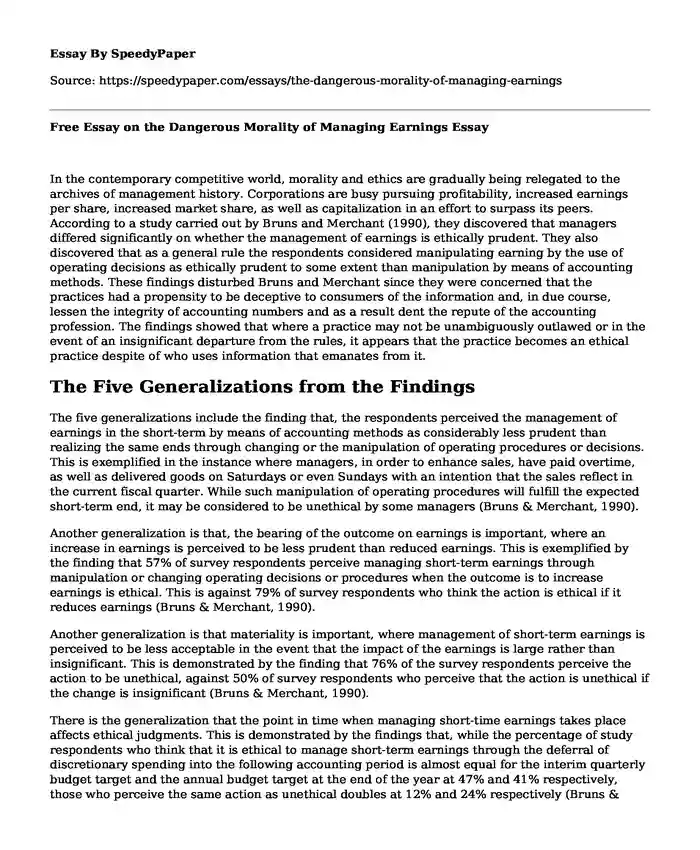
| Type of paper: | Essay |
| Categories: | Management Ethics Accounting |
| Pages: | 3 |
| Wordcount: | 729 words |
In the contemporary competitive world, morality and ethics are gradually being relegated to the archives of management history. Corporations are busy pursuing profitability, increased earnings per share, increased market share, as well as capitalization in an effort to surpass its peers. According to a study carried out by Bruns and Merchant (1990), they discovered that managers differed significantly on whether the management of earnings is ethically prudent. They also discovered that as a general rule the respondents considered manipulating earning by the use of operating decisions as ethically prudent to some extent than manipulation by means of accounting methods. These findings disturbed Bruns and Merchant since they were concerned that the practices had a propensity to be deceptive to consumers of the information and, in due course, lessen the integrity of accounting numbers and as a result dent the repute of the accounting profession. The findings showed that where a practice may not be unambiguously outlawed or in the event of an insignificant departure from the rules, it appears that the practice becomes an ethical practice despite of who uses information that emanates from it.
The Five Generalizations from the Findings
The five generalizations include the finding that, the respondents perceived the management of earnings in the short-term by means of accounting methods as considerably less prudent than realizing the same ends through changing or the manipulation of operating procedures or decisions. This is exemplified in the instance where managers, in order to enhance sales, have paid overtime, as well as delivered goods on Saturdays or even Sundays with an intention that the sales reflect in the current fiscal quarter. While such manipulation of operating procedures will fulfill the expected short-term end, it may be considered to be unethical by some managers (Bruns & Merchant, 1990).
Another generalization is that, the bearing of the outcome on earnings is important, where an increase in earnings is perceived to be less prudent than reduced earnings. This is exemplified by the finding that 57% of survey respondents perceive managing short-term earnings through manipulation or changing operating decisions or procedures when the outcome is to increase earnings is ethical. This is against 79% of survey respondents who think the action is ethical if it reduces earnings (Bruns & Merchant, 1990).
Another generalization is that materiality is important, where management of short-term earnings is perceived to be less acceptable in the event that the impact of the earnings is large rather than insignificant. This is demonstrated by the finding that 76% of the survey respondents perceive the action to be unethical, against 50% of survey respondents who perceive that the action is unethical if the change is insignificant (Bruns & Merchant, 1990).
There is the generalization that the point in time when managing short-time earnings takes place affects ethical judgments. This is demonstrated by the findings that, while the percentage of study respondents who think that it is ethical to manage short-term earnings through the deferral of discretionary spending into the following accounting period is almost equal for the interim quarterly budget target and the annual budget target at the end of the year at 47% and 41% respectively, those who perceive the same action as unethical doubles at 12% and 24% respectively (Bruns & Merchant, 1990).
The final generalization of the findings is that the technique of managing earnings bears an effect. This is exemplified in the findings that, in increasing short-term earnings in order to meet budget targets, the technique employed is perceived differently in terms of whether it is ethical or unethical. This is exemplified in the study findings where 80% of the study respondents perceive the action as ethical when the method employed is selling surplus assets and attaining a profit against 4% of survey respondents who perceive the same method to be unethical (Bruns & Merchant, 1990).
The Managements Ability to Manage Earnings in the Long-Term
Bruns and Merchant (1990) demonstrate that management falls short of the capacity to manage long-run earnings through manipulation of financial accounting. This is evidenced by the assertion that any person who draws on information concerning short-term earnings is at risk of manipulation, delusion, or planned fraud. The authors argue that, devoid of a comprehensive analysis of the expenditure on operating manipulations, the risks of these manipulations may be underrated at the expense of the long-term overall financial well-being of the organization.
References
Bruns, W.J., & Merchant, K.A. (1990). The Dangerous Morality of Managing Earnings. Management Accounting, 72, 22-25.
Cite this page
Free Essay on the Dangerous Morality of Managing Earnings. (2021, Jan 25). Retrieved from https://speedypaper.net/essays/the-dangerous-morality-of-managing-earnings
Request Removal
If you are the original author of this essay and no longer wish to have it published on the SpeedyPaper website, please click below to request its removal:
- Free Essay Example on the Genocide in Cambodia
- Alcoholism Essay Example
- Leadership Paper Example of the Charge Nurse
- Hills Like White Elephant - A Literary Essay Example
- Unorthodox Strategies by Lockheed, Business Ethics Essay Example
- Free Essay on the U.S. Military Operations, Battles, and Campaigns - Land, Sea, And Air
- Essay Example. Reason for Trading Berkshire Hathaway's Stocks.
Popular categories




